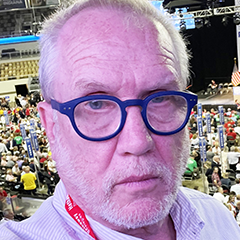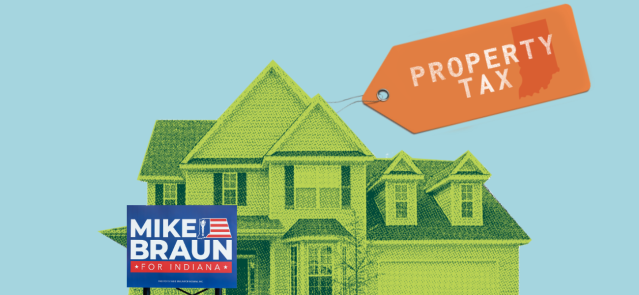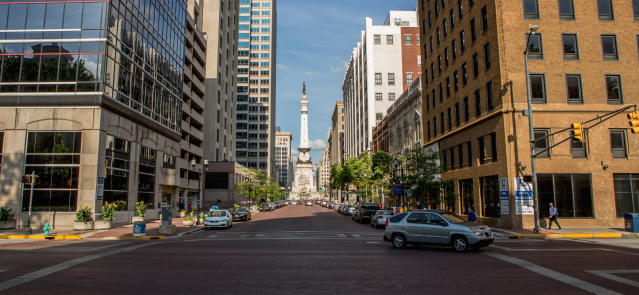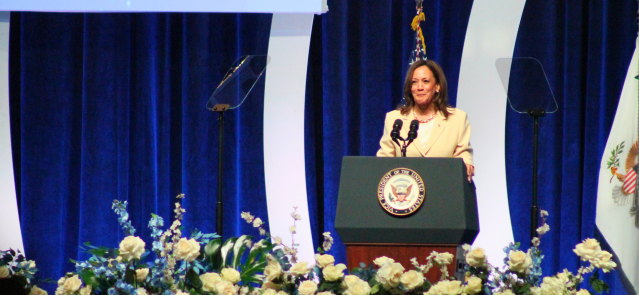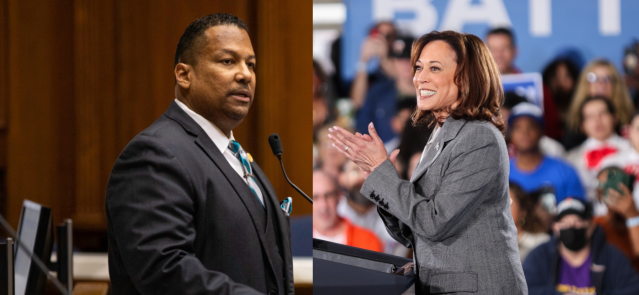Stay ahead of the curve as a political insider with deep policy analysis, daily briefings and policy-shaping tools.
Request a Demo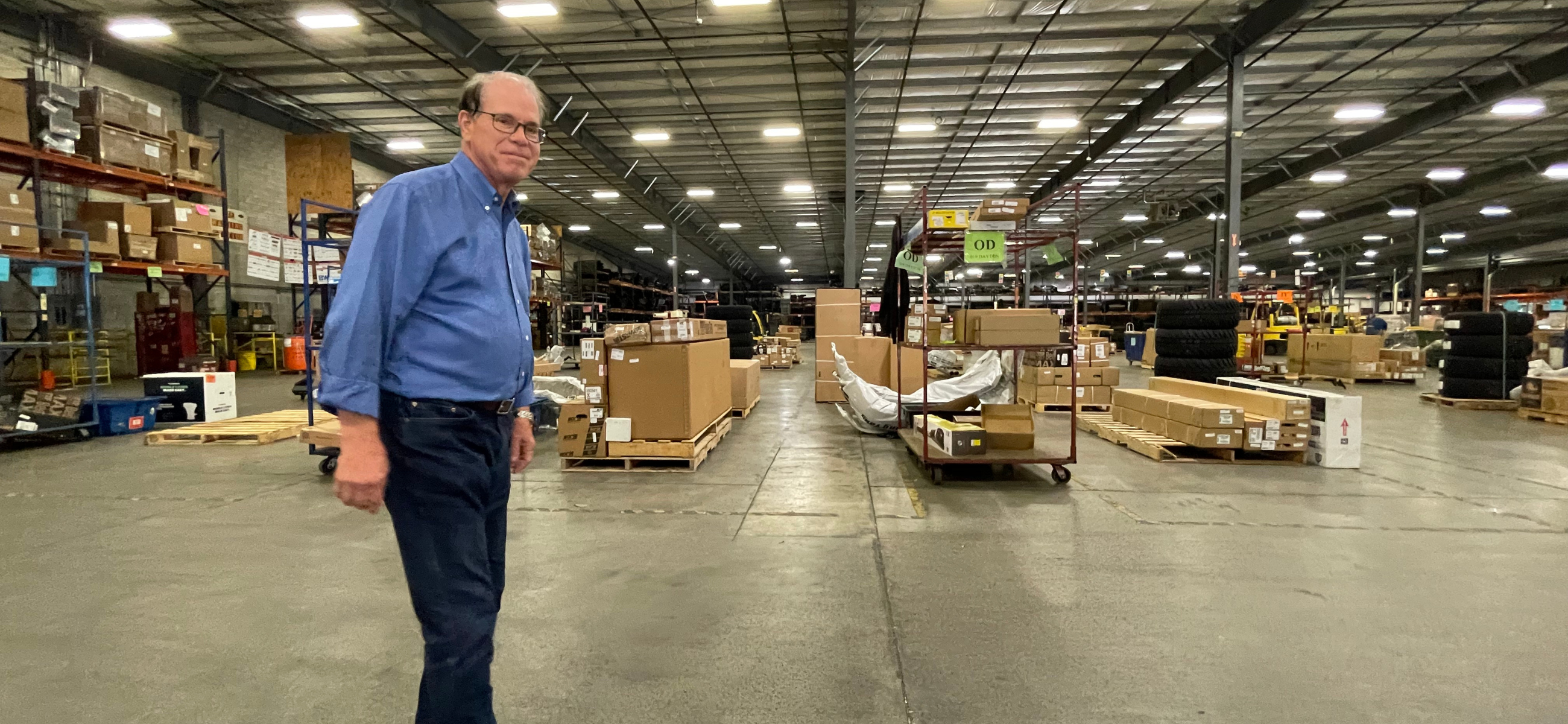
U.S. Sen. Mike Braun walks the floor at his company. (Credit: Brian Howey)
JASPER, Ind. — To understand the Mike Braun story means coming here to this bustling little city in the wooded rolling hills about an hour north of the Ohio River.
U.S. Sen. Mike Braun, a Republican candidate for governor, left Jasper to attend Wabash College, then earned an MBA from Harvard. While he says many of his classmates headed for Wall Street or Silicon Valley, he headed back home. He bought what he calls a “hard scrabble” company — Meyer Body — in nearby Haysville, then built it up to be a sprawling 1,500 employee national company.
Related: A preview into the GOP gubernatorial primary
“There’s no substitute about seeing the context of where you’re coming from,” Braun said during a walking tour on Nov. 6 of this 270,000 square feet complex. “My major piece of work, you’re looking at it right here.”
In Hoosier politics, a candidate for governor most likely points to his public service record, which in Braun’s case is his 10 years on the local school board, three years in the Indiana House and five more in the U.S. Senate. But he points to much of his policy underpinnings to these seven acres. It is a beehive of activity, with beeping forklifts and transporters shifting product and on to tractor-trailers, while Aerosmith rock music blares in the background.
There are loading docks where employees were filling semi-trucks with everything from Weather Tech floormats to kayaks, auto parts to plastic deer blinds. The company is within a two-day drive to most of its U.S. markets. It’s one of the reasons why he championed the Mid-State Corridor that would connect Northern Kentucky with a highway to Central Indiana.
Joshua Kelley, his senior advisor who would be his chief of staff if elected a year from now, describes the bill he helped pass in the Indiana House “created the ability for local governments and civic leaders to create a Regional Development Authority that would fund the initial phases on the study and planning required to build a state road. The model is based on skin in the game coming from local leaders. The RDA in Mike’s area funded the initial study and planning to the point where INDOT is now in the lead building the Mid State Corridor.”
It was here in Jasper that he figured out that running a distribution company was more scalable than being a manufacturer. “The thing about being a distributor is you don’t have to worry about the next best mousetrap taking you out,” he said.
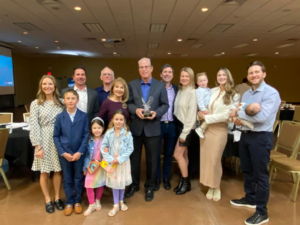
It was here that 15 years ago he pursued a new path toward providing more cost-effective health care options for his employees that has transformed his viewpoint on commodity draining states and private industries. It is here that three of his four kids now head up what he calls a “team of young executives” to run this thriving business.
“I fixed health care in my own business, have healthier employees, cut costs 15 years ago, created health care consumers out of my employees, and know some of the things I can do for coverage of our own state employees,” he said.
I found Sen. Braun in an office in the “old building,” or the original part of the complex. The cramped office had the trappings of an industrial middle manager, except there is a U.S. Senate logo on the wall behind his desk, which features a tripod and a camera for making videos. There are three chairs in front of his desk. He’s there most Fridays and commutes from a home on a stand of forest about 10 miles away. He owns a number of tree farms scattered around DuBois County and beyond.
Braun is what Howey Politics Indiana calls the “nominal frontrunner” in a six-person GOP gubernatorial field that also features credible rivals Lt. Gov. Suzanne Crouch, former Attorney General Curtis Hill and two former Indiana Economic Development Corporation heads — Brad Chambers and Eric Doden. Braun won statewide when he upset U.S. Reps. Luke Messer and Todd Rokita for the GOP nomination before defeating Democratic U.S. Sen. Joe Donnelly in 2018. Braun leads the money race and, as he did in 2018, has the ability to cut multi-million dollar personal checks when needed. In his 2018 Senate race, he spent more than $10 million of his own funds.
He was also recently endorsed by former President Donald J. Trump and Club for Growth.
Throughout Hoosier history, past governors ranging from Oliver P. Morton to Evan Bayh have gone from the governor’s office to the U.S. Senate. Braun has twisted that. “You know why?” he asks. “Because they’re from the farm system of politics.”
Sen. Braun considers himself to be from another league. Traditionally, Senate and governor caliber candidates get a law degree and quickly jump into politics. Braun built a business instead. His entry into politics came via the local school board after his wife Maureen declined to run.
Braun’s website declares: “Indiana’s best days are ahead of us. I am running for governor because I am worried about whether or not we will leave this country in better shape than we found it for the next generation. After serving Hoosiers in Washington, I know now, more than ever, our problems can’t be solved by the special interests and career politicians in D.C., they must be solved right here at home.”
On his campaign website, Braun lays out a dozen point agenda that includes Hoosier jobs and economic growth; improving education; healthcare affordability; reliable, affordable, and clean energy; agriculture; and cutting taxes while reducing the size of government.
The Braun website also addresses these other hot-button issues: Putting kids first, protecting parents rights, standing up to “woke” corporations, pro-life issues, standing with law enforcement, securing the southern border, defending Constitutional rights, election security and reform, and ending Covid-19 mandates and lockdowns.
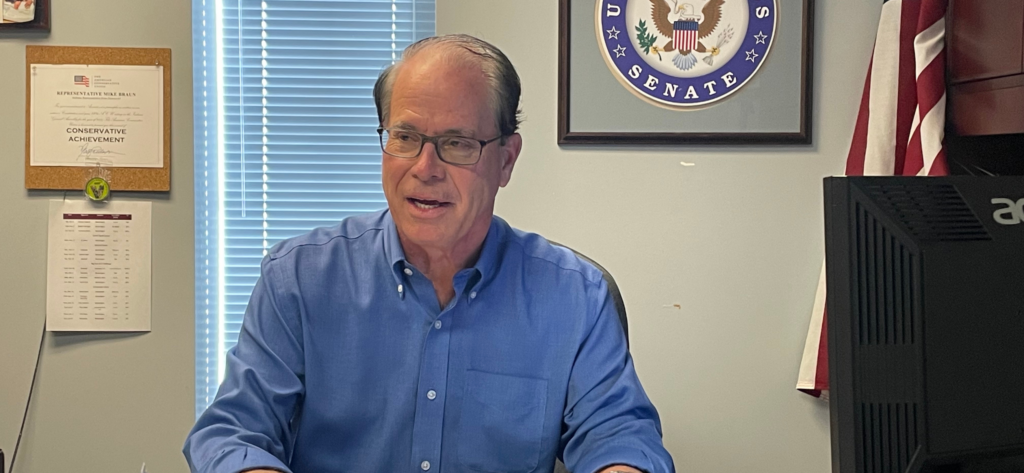
After our tour, HPI conducted this nearly hour-long interview with Sen. Braun. It has been edited for clarity and brevity.
Q. I usually start by asking you to give an overview of your campaign, of where you think you’re at and what we can expect between now and the General Assembly session.
A. Most of us are going to be out focusing on fundraising, on getting out into the field because of the ground game. Most people aren’t going to be [paying] attention to that, other than the folks who are into politics until after the first of the year. For me, since I did this basically six years ago, I’m basically using the same team who helped me become senator. It’s a great political team that knows the Indiana market well. The same folks who helped me creatively are doing that again. The big difference this time is it’s not our first rodeo. I started [in 2018] in a position that looked fruitless. The first poll had me at 1%. If you remember, Todd Rokita and Luke Messer were the two favorites. There were three other individuals in the race then. When I decided to run for governor, it was a situation of either/or. If you did not do it now, it would be another nine years. I pledged not to run for more than two Senate terms. I would have never reneged on it. This was basically a decision on what made the most sense. Here a lot of that framework was in place. It will really be no different than what I did then. I declared in August of ’17 to run for the Senate. Here I declared eight months prior to running for governor because it was already clear there would be two in it and now there are two more since then.
Q. And you’re not going to catch anyone off guard. Brad Chambers and Eric Doden are already running TV ads. Talk about that change of dynamic from six years ago.
A. Most didn’t give us a chance of making it to first base let alone making it home. Here I think I come in with the advantage of having a record. No one else really does. Chambers and Doden haven’t held any elective office. Both worked in government, in economic development. Suzanne has been part of an administration but not with a clear voting record of recent vintage. Curtis Hill was the attorney general. The big difference would be that I have a record out there that was fairly clear from when I was a state legislator from 2015-17 and then as a U.S. senator from January ’19 through the present. When it comes to the political side of it, I declared before Messer and Rokita did. It was just that most people didn’t give me a chance to go anywhere. Here, we come in as a sitting senator. It’s a much different dynamic in how the political market is going to accept you. I think we’re in good shape because we’re fairly solid when you look at the record I’ve got. Politically this is less of a mystery in terms of what to do. We just need to execute in a similar way to what we did in ’18 and get the message out that will resonate with Hoosiers. I feel confident we’re going to be able to do that.
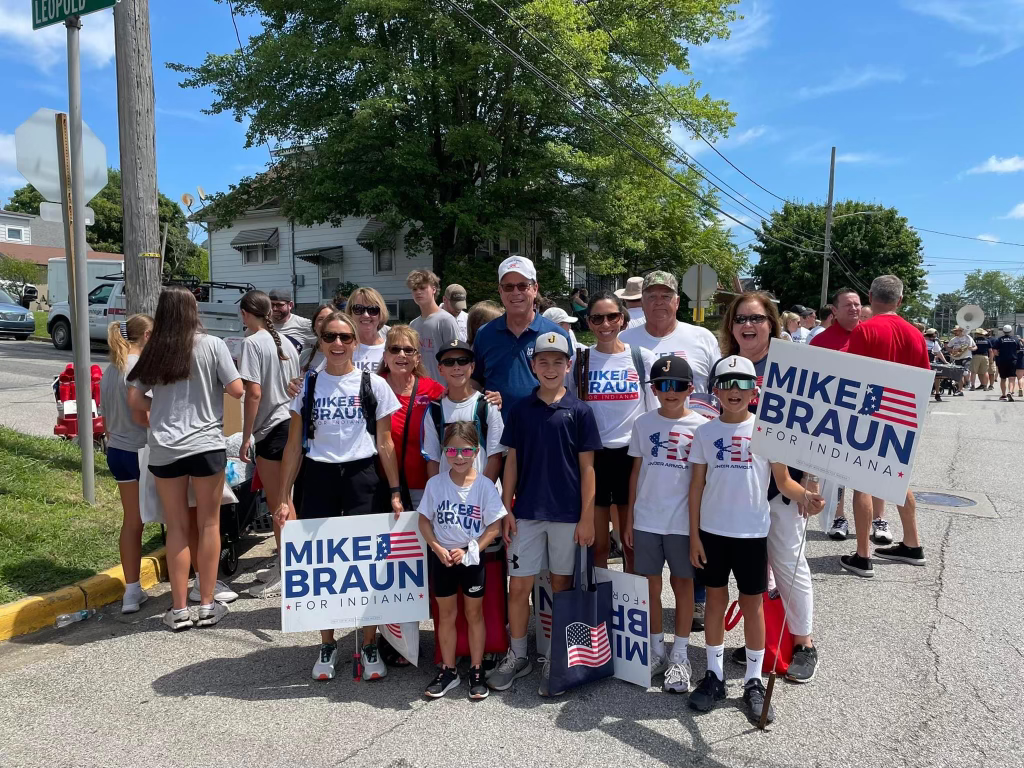
Q. When you met with reporters a couple of months ago you talked about your fundraising. You’re not planning on writing the big personal checks. We’ve noticed that Chambers is also feasting on big donors right now.
A. He has a lot of liquidity which is formidable. He’ll have to use most of it for name ID. Our fundraising part has been the most gratifying. It’s definitely with a base of funds that would be a lot broader than any of my competitors, especially Doden and Chambers. Curtis Hill has not been in the race long enough to see what he is going to do. The first period when you could measure all of us; Brad Chambers wasn’t in there nor was Curtis, we had a lot more contributors than Doden or Crouch with a lot broader base and raised a lot more than either one of them. Suzanne raised $1.1 million and we did about $2.2 million and Doden was in between. A lot of that came from a narrow group of donors including a family business.
Q. I’ve written that in past open Indiana Republican gubernatorial races, the field has winnowed down between two or three candidates. Have you had any discussions with the other candidates? Or do you expect this field of six to continue all the way through the primary?
A. It appears to me that everybody intends to [stay in]. So far, when you look at the polling I think we’re in as solid a shape as we could be. I base that mostly upon all the hard work invested as a senator, but a record that is generally resonating with Hoosiers and the fact that I visit all 92 counties each year. Something you probably aren’t aware of but we recently announced we’ve completed 10,000 cases for Hoosiers.
Q. Constituent cases?
A. Yes. It’s unbelievable. It’s closer to 11,000 now. We did that on behalf of veterans, immigration, Social Security, and the whole spectrum of how you can get entangled with the federal government. That is one of the proudest parts of being a U.S. senator. For folks back home, that’s going to touch them more than legislation. When we were named by two independent organizations as the most effective Senate office by any Republican in the last Congress and having those same types of stats in the 118th Congress … that brings a lot to the table. I think that will give us the biggest advantage once we come to the voters in the primary and then [in] November.
Q. What does the Donald Trump endorsement do for you?
A. I’ve been involved with Trump since I ran for the Senate. He came into Indiana four times, if you remember.
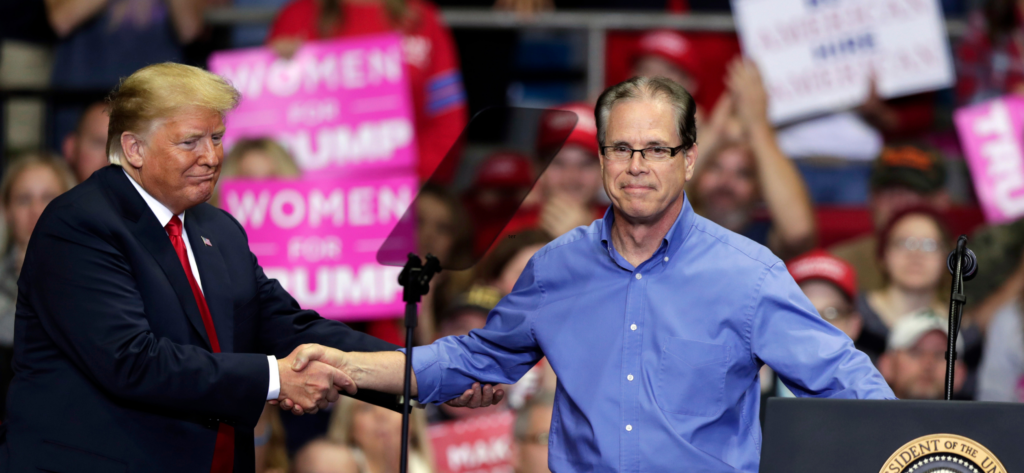
Q. I thought it was six.
A. It would have been Evansville, Southport, Elkhart two days after the primary was over, and Fort Wayne, which was the Monday before the election. It four times with rallies. And Trump, in almost any poll, he’s as strong now as he was in ’16 or ’20 among Hoosiers.
Q. Does that surprise you, given the 91 criminal indictments he faces?
A. Not when I know why he resonated. He was a representation of half the country teed off with business as usual in D.C., and from a broad mix of the electorate. It would have been the Republican Party that was not liking the results in .D.C where they do very little as original Republican legislation and generally make all the spending deals with 10 or 15 Republicans and all the Democrats each year. So there was an uneasiness of what the Republicans stood for nationally. Trump comes on the scene and you watched it like I did in 2015 when he cleared the field.
Q. It was fascinating.
A. It’s always easy to go after one’s peccadillos that you don’t like or you’re not comfortable with, but it’s kind of like, look at the market, and the market didn’t like the status quo. Trump represents that still. You look at pre-COVID, that was peace and prosperity, compared to the mess we’ve got now, which to me is Biden and [Democratic control of] both chambers, a sugar-high economy. We’ve got a mountain of debt and we’ve got inflation. You make it just that simple and that’s the true difference. And it’s binary; Biden or Trump. When people get through some of the other stuff about what they didn’t like about Trump it’s clear they’re starting to put 2+2 together and it’s clear people don’t like our economy. To me any economy that’s built on borrowing money from your kids and grandkids, [we] should be a little leery of that. What it does mean is how you draw the comparison of what you’ve got now and especially what we had pre-COVID. COVID took the nation in its grip and then we got through that. Trump’s on the ballot here in Indiana and he [polls] at 55-60% and no one else is much into double digits, if that.
Q. A couple of more Trump questions before we get back to Mike Braun. If Trump is convicted of a crime, does that make his endorsement a problem?
A. There’s a political intertwining. You look at all the venues and almost all Republicans will say that it has a political underpinning. Whether those indictments get parlayed into a conviction, I’m just extrapolating what I see Republican primary voters are doing. I don’t think that makes much difference.
Q. Donald Trump has talked about nullifying the U.S. Constitution and has called for the execution of the out-going chairman of the Joint Chiefs of Staff Gen. Mark Milley. Does that type of rhetoric concern you?
A. Obviously that stuff is not the stuff I would put out there. I think that hurts rather than helps the cause because it further polarizes the people that might even like his policies. That’s a difference in approach. I respect everyone’s ability on how they’re going to sell themselves. I would stick on looking at the record in terms of the way it was pre-COVID, and the stuff you can’t change, I don’t know really what the point would be to further talk about it, because you can’t fix it. That toothpaste is out of the tube. I can tell you that every one of my opponents would have loved to have the endorsement in a state like Indiana.
Q. What would a Gov. Mike Braun administration look like?
A. I’ve always separated in a very simple way folks who come from the political system. I call that the “farm system”. I’m not that. I come from the real world of building a business. You’ve seen that. That was my life’s work. I was always interested that if that window opened, to jump through it. Well, you never know how that might eventuate. It’s just how I got to the dance floor. It was 19 years ago and my wife gets a call to be on our local school board. She was so busy; she had her own business. She literally ended the conversation saying she “had no time to do it, but maybe my husband would.” That’s how I got into the public arena and I did that for 10 years. Then Rep. Mark Meissmer called me in late 2013 when he decided to run for state Senate. He asked if I would be willing to run for his seat. That’s how I became a legislator. I got some novel legislation done. I was honored when Ed Soliday asked me to be co-author of the road bill. I found out you can get stuff done through the legislative process. So what I’ll bring to bear as the governor will be someone who will be entrepreneurial politically. To me if you’re a good entrepreneur, politics is easier than building a business. It’s just got tighter compression in terms of the political hurdles you need to jump.
Q. And the issues?
A. I’m going to make sure that we address all the critical issues. A lot of them I ran into while running a business, including the high cost of health care in this state. We’ve got one of the highest health care costs of any state and some of the poorest health care outcomes. I fixed health care in my own business, have healthier employees, cut costs 15 years ago, created health care consumers out of my employees, and know some of the things I can do for coverage of our own state employees.
Q. Will that translate to 6.8 million Hoosiers? Can you take those fundamental building blocks on health coverage and bring them to the masses?
A. Sure you can. That’s owning your own health care and well-being. That’s basically what I did here. I gave the best tools to my employees to do that. I put skin in the game on their minor health care to where they shop around for the small stuff, and they’ve got the best coverage when they get critically ill or have a bad accident. Insurance companies told me all of that. They were making so much money on our plan back then I decided to self-insure and basically solved health care as most companies would love to do, but had to be entrepreneurial. I just basically took what the insurance companies told me, saw how much money they were making covering my business, created it as a cost center and not a profit center and that’s how I fixed things. High cost of health care in the workforce is what I hear most about pre-COVID, and it’s worse now post-COVID. We’re going to have to realign our education system to create degrees that have markets for those degrees in Indiana, otherwise we’re shipping one of our own out of state to find a job. I want to make sure that kids, once they go through K-12, are getting some life skills that are beneficial regardless of whether you enroll [or] enlist … I’m going to make sure we accumulate the data that shows what skills we should be pushing in addition to Advanced Placement in high school that’s going to prepare everyone broadly for 65% of the jobs that need nothing better than a good high school education.
Q. You were on the school board when Mitch Daniels was governor. Then you were in the General Assembly when Mike Pence and Eric Holcomb were governors. What did you glean from their leadership styles? And are there other governors — Mike DeWine, Brian Kemp, Ron DeSantis, Greg Abbott — that you’ll model after?
A. There are a lot of states that have shown — look at Georgia, Texas, Florida, for instance — as well as most of the states that have better growth rates, not all of them but most of them, are being run by Republicans. I’ll be able to distill best practices. Look what Mitch Daniels did. He came in 2004, he inherited a budget that was in the red that had been run recently by Democrats. So he had to get the state’s financial cash flowing. And then you look at what he did when he started to address issues. We are the “Crossroads of America” and we weren’t even funding roads the right way. Almost every penny of the fuel tax was being spent on other stuff. He [Daniels] started fixing things that would have been most apparent that needed to be fixed. One reason he did that with good leadership, besides the fact that he’s a brilliant mind, was he was also willing to take risks. If you’re not willing to take risks you’re going to be in a broad band of mediocracy, whether it’s in business or government. You don’t want to take on too much; you want to leave your neck intact politically and operationally and he was willing to do that. I think Pence and Holcomb inherited a much better-run state government and have enhanced it in their own ways since then. The difference between me and a Pence or a Holcomb would be [that] I spent my time in the trenches of building a business from scratch. That’s why I took time to show you. I had to compete with local folks, regional, national. I learned a lot, I understand because all along the way I never had a board of directors. I put the team together with my two sons, a great team of young executives to build all of this. Mitch didn’t have the benefit of being a legislator.
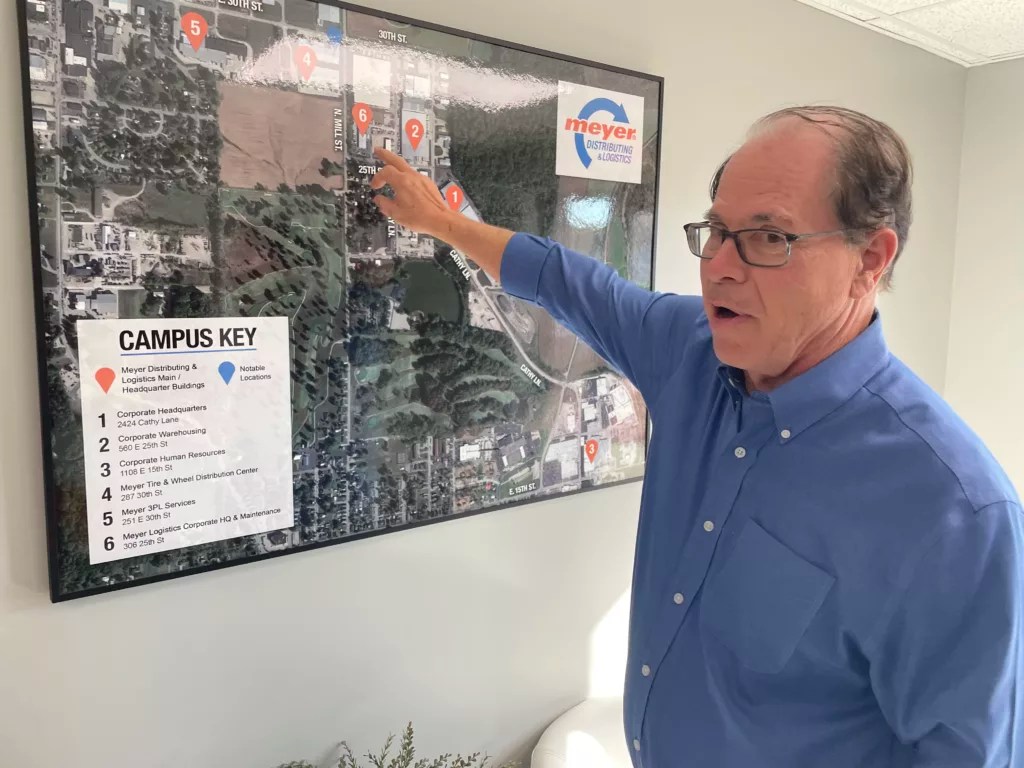
Q. Nor did he have the super majorities that Gov. Holcomb has. The difference between what he had to go through in the General Assembly to achieve his results compared to Gov. Holcomb.
A. It’s a lot different. I would say that Mitch coming in, fixing a government that was not functioning well, and then cash flowing it. Then look what he did at Purdue. No university president in the country thought they could freeze tuition, room and board and have that work. He showed that you can do that. He told me how he was going to do that when I was a freshman legislator in ’15. He wasn’t shrinking away from anything. He told me he wanted to take a four-year degree and make it doable in three years. He said he was going through every Purdue location making sure it was running like a business. Then he said he was going to take on fringe benefits like I had just done seven years before that and I just said, ‘Wow. I’m going to keep doing those things in state government. I’ll go through every agency to make sure it’s running well; that we have people staffed well to do the job they’re supposed to do. If they’re doing it well, I’ll be able to tell it. We’re gonna make some changes.’ But I do think that having run something coming from the business world has got to be a blessing or a plus if you want to be the CEO of your state government.
Q. In Indiana history, from Gov. Oliver P. Morton to Evan Bayh, ex-governors ended up in the U.S. Senate. You’re attempting to do the opposite.
A. You know why? Because they’re from the farm system of politics. That may have looked good then but what if you joined now? Ever since the Reagan years when we started running deficits, it wasn’t being run responsibly for future generations. Whatever your issue is — for [President George W.] Bush, it was litigating two Gulf wars; for [President Ronald] Reagan, it was to make the economy more vibrant, which was smart when he made tax cuts. But along with that should have come spending cuts. You can’t do one and expect spending to be in lock step with it. If you grow your economy and keep your spending relatively flat you could probably cut taxes and not run deficits, but it’s a much more complicated package than that. The people who got done being governor just weren’t done with politics. They wanted to continue. My blessing is I did something in the real world first before I decided to get into politics at a level of significance.
Q. Do you feel you’re more of an executive in heart and soul?
A. I feel I’m good at both because legislatively I knew what to get done as a legislator. I passed a unique regional authority bill that helped us down here on a road project we talked about for 40 years in the abstract. To me if you’re an entrepreneur you know how to get from here to there.
Q. Or if you don’t know, you figure out a way.
A. You do. And again, I had to figure out almost everything in terms of how to take that hardscrabble business and turn it into a successful one. I think the difference basically is if you come from the typical farm system political background, you get a law degree, pivot almost immediately into elected or appointed politics and even practice your trade. But most people who end up wanting to become a senator picked politics in elected or appointed office as their career. I think that’s a big mistake. I don’t think you learn near enough once you get there. If you don’t have the real experience you’re going to depend heavily on your chief of staff. Mitch knew business along with government. That’s why he felt comfortable on what to do when he became the state’s CEO.
Q. Doc Bowen ran on property tax reform. Other governors ran on major initiatives. What would your major initiatives be in the first or second year of a Braun administration?
A. Tackling high health care costs, along with half our budget is K-12. We have to do better than reading levels we have now. That’s got to get better. So education, career and technical education, and doing a better job with what most of state government is about. You throw in getting rural broadband into every nook and cranny at a pace faster than what we’re doing is going to be important. Affordable housing comes up as a big issue for many communities. And, mostly, how do we keep our talent here in the state? That is going to be a combination of everything I just talked about. I hear so often that kids want to come back and they don’t see the opportunity of doing so. We’ve got 50 of our 92 counties which are flat or losing population. That’s why rural broadband is so important. I want to turn that brain drain around. And then you’ve got other issues like law enforcement, feeling that you can come back to a community that is safe. I think we’ve lost that in our own state capital of Indianapolis.
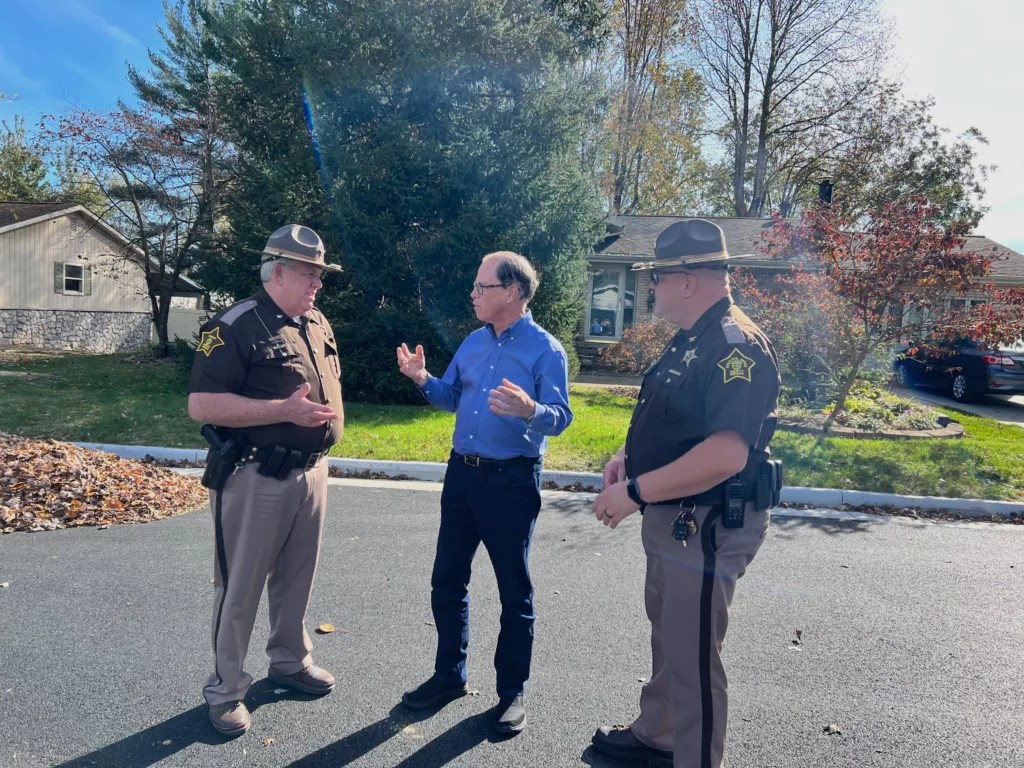
Q. What have you observed recently in Indy?
A. What I have observed the summer before, walking from Monument Circle to the Statehouse I had to side-step seven or eight people lying on the sidewalk. You’re not going to get families from around the state taking a weekend vacation in Indy like they would 10 years ago. We’ve got to get back where law enforcement is; you don’t talk about crazy stuff like defunding the police. I put out a real detailed platform. You can go to MikeBraunforIndiana.com and it will cover about 12 areas that we’re going to wade into.
Q. What is your critique on Lt. Gov. Suzanne Crouch’s “Axe the Tax” plan on income taxes?
A. Well, everybody would love to have lower taxes in general. You axe the tax, which means you get rid of it immediately …
Q. She has said it will happen over time.
A. At first she just said “axe the tax” that generally means you do it abruptly and quickly. She should have said, like all of us, we want to lower that over time. Then you’re going to have to have real ways to have government operate more efficiently to finance a tax decrease. We are already headed towards a rate that is supposed to settle at 2.9%. I’d say if you want to do that, when she was asked how to do it, I can’t recall that she came up with a way. I’ve already got ideas on how I want government to run more efficiently, how I’m going to save money for Hoosiers by making them healthier and doing a lot of things that would enable us to maybe spend less, to go through every agency to make sure they were working efficiently. That’s how you finance lowering our tax rate without creating a big hole in the budget.
Q. You’ve said “I’ve got a Senate record. Look it up.” Walk us through the highlights of your Senate record.
A. I’ve been acknowledged by two independent groups [Center for Effective Lawmaking and Scripps News] that I’ve been the most effective Republican senator and that would be in the categories of education, health care and agriculture. Most effective. And when you’ve been the most active Republican senator, which means broadly on legislation, it’s in all arenas, even beyond those three. We’ve done that as a freshman Senate office. That was in the last Congress and we’re staged to do the same thing in the 118th Congress. It’s been in a broad array of areas.
Q. Let’s talk about the lieutenant governor nomination process. Doc Bowen and Steve Goldsmith allowed the convention delegates to choose their running mates in 1972 and 1996. We’ve got Rev. Micah Beckwith of Noblesville already running for LG.
A. I’m hearing another individual or two might. I don’t think they’ve declared yet.
Q. Traditionally a nominee wins the primary and several weeks later they name a running mate.
A. I’m going to have a good feel for where the convention is at. I think I’ll get along with the delegates there, just as I’m going to get along with most of our supermajority. That means we’ve got a lot of opportunity both legislatively and politically. So whoever makes their case that appeals to the delegates at the convention, I’ll pay attention to that. I’ve had a lot of people interested in being my business partner, not only as an LG, but more broadly in the administration. They know I’m not a farm system politician. I’ve shown I’ve been able to get things done in a pretty dysfunctional Senate. So I feel good about the number of people who have come to me and want to be a part of it.
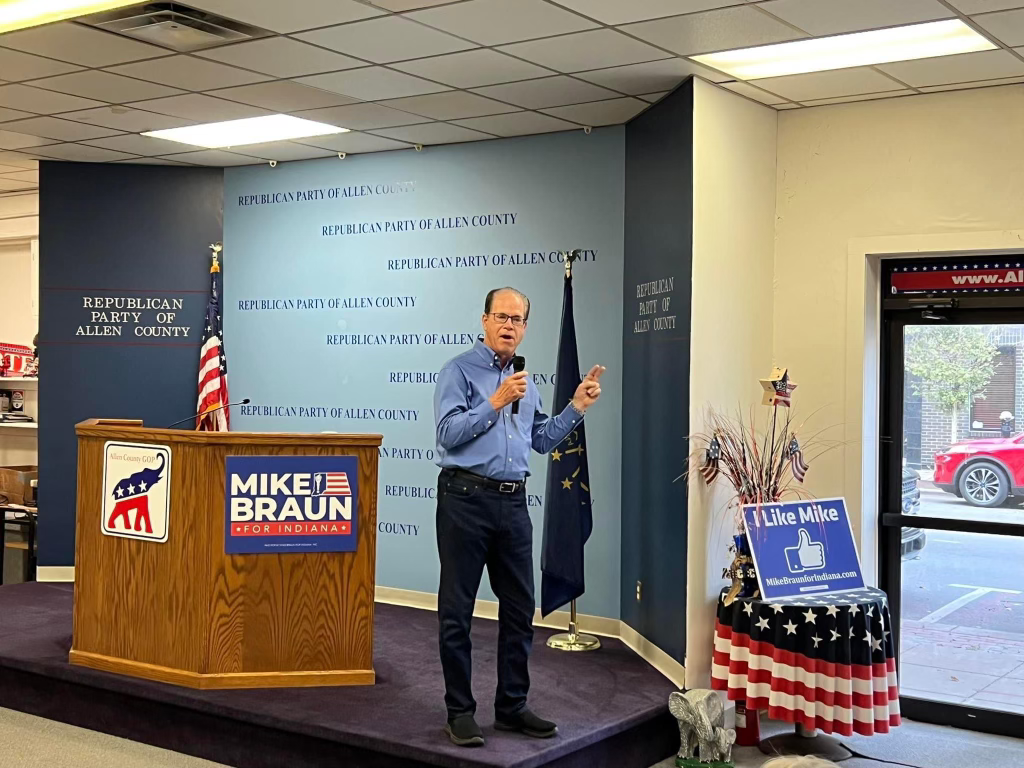
Q. If you’re nominated, you’re probably going to face Democrat and former superintendent Jennifer McCormick. Any observations on her?
A. I’ll just say the only thing I’ve seen out of her recently is that she released a poll …
Q. Yeah, if you believe that.
A. It was interesting. I don’t know what the margin of error was but I assume it had some integrity to it and it showed she and Crouch within the margin of error, it showed her and Hill tied and we were up 46-35%. She’s the competition. I’ll have to take that part of the race on just like I took [U.S. Sen. Joe] Donnelly on.
Q. What is your internal polling show? How do you win the primary?
A. We’ve done one poll that we haven’t released the information publicly. It’s got us in a very, very strong position, way ahead of Suzanne Crouch, and the other three candidates are in single digits. We’re getting a feeling of high favorables, low unfavorables and that’s a good place to be. Generally when you’ve been in the [U.S. Senate] job for five years, you’re not in that good of shape.
Q. What’s a typical Mike Braun work day?
A. Go to bed late, get up early. I’m lucky I can thrive on that.
Q. If you’re nominated and elected governor, will you serve two terms?
A. I would intend to. I’m going to see what I can get done during the first term. [Like] most governors do, I intend to make strong headway right out of the gate. My major piece of work you’re looking at it right here.
Brian Howey is senior writer and columnist for Howey Politics Indiana/State Affairs. Find him on Facebook and X @hwypol.
Know the most important news affecting Indiana
Get our free weekly newsletter that covers government, policy and politics that impact your everyday life—in 5 minutes or less.
4 things to know about Braun’s property tax proposal
Sen. Mike Braun, the Republican candidate for Indiana’s governor, released a plan for overhauling property taxes Friday morning that would impact millions of Hoosiers, Indiana schools and local governments. “Nothing is more important than ensuring Hoosiers can afford to live in their homes without being overburdened by rising property taxes driven by rapid inflation in …
Bureau of Motor Vehicles looks to add new rules to Indiana’s driving test
The Bureau of Motor Vehicles wants to amend Indiana’s driving skills test, putting “existing practice” into administrative rule. Indiana already fails drivers who speed, disobey traffic signals and don’t wear a seatbelt, among other violations. Yet the BMV is looking to make the state’s driving skills test more stringent. A proposed rule amendment looks to …
In Indianapolis, Harris says she’s fighting for America’s future
Vice President Kamala Harris, the presumptive Democratic presidential nominee, told a gathering of women of color in Indianapolis on Wednesday that she is fighting for America’s future. She contrasted her vision with another — one she said is “focused on the past.” “Across our nation, we are witnessing a full-on assault on hard-fought, hard-won freedoms …
Indiana Black Legislative Caucus endorses Harris, pledges future support
The Indiana Black Legislative Caucus unanimously voted Wednesday to endorse Vice President Kamala Harris’ presidential run and will look at ways to assist her candidacy, the caucus chair, state Rep. Earl Harris Jr., D-East Chicago, told State Affairs. The caucus is made up of 14 members of the Indiana General Assembly, all of whom are …
